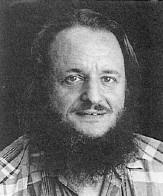

Conway's father was a chemistry laboratory assistant, and John became interested in mathematics at a very early age. His young years were difficult, for he grew up in Britain at a time of wartime shortages, but he excelled in school, especially in his interests of mathematics, astronomy, and fossils.
Conway entered Gonville and Caius College Cambridge to study mathematics, and he was awarded his BA in 1959. In his graduate studies, he studied number theory, and became interested in infinite ordinals and game theory. He was awarded his doctorate in 1964, and was appointed as Lecturer in Pure Mathematics at the University of Cambridge.
After some unproductive research in mathematical logic, Conway found the symmetry group for the the densest packing of spheres in 24 dimensions known as the Leech lattice. This group had as subgroups almost all the finite sporadic simple groups known at the time, and was a remarkable contribution to group theory. Conway announced his discovery in 1968 and published full details the following year. In 1970 Conway was elected to a fellowship at Gonville and Caius College Cambridge and, 3 years later, he was promoted to reader in Pure Mathematics and Mathematical Statistics at Cambridge.
He became well known outside the world of mathematics shortly after this with his invention of the Game of Life. In the 1940's, John von Neumann had constructed a complicated universal constructor, a set of rules on a grid that could build copies of itself. Conway succeeded in simplifying his rules considerably. Conway showed the game to his friend Martin Gardner who described it in an October 1970 column of Scientific American. The game became an instant success, Conway became a household name, and the field of cellular automata was born.
Another topic for which Conway is famous is the discovery of surreal numbers. The surprising fact is that Conway was not trying to develop number systems, but rather was analyzing the game of Go, in which endgame positions took on values of surreal numbers. This started the field of combinatorial game theory.
In addition to these major discoveries, he has done leading research in knot theory, number theory, game theory, quadratic forms, coding theory, and tilings. He is also known for the Doomsday algorithm to calculate which day of the week a date falls on.
Conway was awarded the Berwick Prize by the London Mathematical Society in 1971. In March 1981 Conway was elected a fellow of the Royal Society of London. Then, in 1983, he was appointed professor of mathematics at Cambridge. In 1986 Conway left Cambridge after accepting appointment to the John von Neumann Chair of Mathematics at Princeton, where much of his work has focused on geometry, in particular the symmetries of crystal lattices. In 1987 Conway was awarded the Polya Prize of the London Mathematical Society. Since then he has won too many prizes and honors to list here.
In addition to his scholarly articles, he has written many groundbreaking and popular books. Among them, On numbers and games, Winning ways for your mathematical plays, Sphere packings, lattices and groups (with Sloane), The book of numbers (with Guy), On Quaternions and Octonions (with Smith), and Symmetries of things (with Burgiel). Conway had a reputation for being a fascinating lecturer, but untidy and unorganized.
He died in 2020 of covid-19.